Does the cashless welfare card work?
SINCE 2016 Ceduna has trialled a controversial cashless welfare card that could be rolled out nationally. But the town is divided on whether it helps – or just discriminates.
STANDING in his backyard just after midnight, wearing a pair of underpants and armed with a club – in this case a traditional Aboriginal waddy – Allan Suter had just scared off intruders who were trying to break into his beachside home.
“I thought ‘that’s fixed’, and went back to bed,” the Ceduna mayor and commercial shark fisherman says with a smile. “But at 3am, our 86-year-old neighbour woke up with an intruder in the house. They’d broken into her house after midnight.”
Suter doesn’t think this was a random event. Earlier that evening one local, frustrated by the mayor’s support for rolling out an Australian-first cashless welfare card, had suggested he lacked empathy for those forced on to the new system.
“There was a post on Facebook from a lady saying ‘maybe if someone broke into the mayor’s house he would know what it feels like’,” Suter says. “The tactics by some people, and I stress some people, have been appalling. I’ve had death threats. They have been malicious in their approach. And that is why a lot of people are frightened to speak. But I’m not.”
Ceduna, population about 1800, sits pleasantly on the far west coast of Eyre Peninsula, 800km from Adelaide, out of sight and mostly out of mind in the state’s capital. But, these days, the town is receiving an unusual amount of attention because of its role as a guinea pig for the Federal Government’s cashless welfare card.
The trial of the card here and in Western Australia’s East Kimberley (where it’s derided as the “white card”), has divided opinion. In Ceduna’s case, it’s also divided the community. Since 2016, about 800 residents – basically anyone who is on the most common forms of welfare, Newstart and Youth allowances – have had to use the card. Those on the Age Pension and Veterans’ Pension can choose to go on it if they wish.
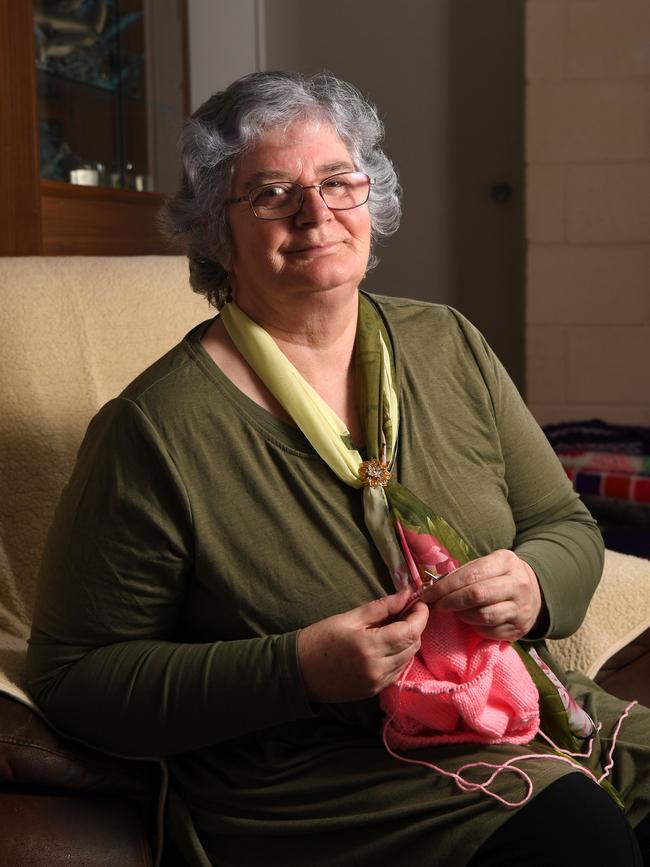
It’s called the Indue card and it looks like any other bank plastic. If you’re on it, 80 per cent of your payment goes on to it while 20 per cent goes into your bank account.
It can be used virtually everywhere that has an EFTPOS machine and a raft of online retailers – but it cannot be used to buy alcohol, gamble or withdraw cash. That means for a family receiving $1000 a fortnight, $800 is locked to the Indue card while $200 can be taken in cash. It’s a radical concept but, if it works, there will be arguments for it to be pushed out into other parts of the country high in welfare dependence where booze and violence are problems.
Senior members of the Coalition, including Cabinet ministers, see the card, and measures like drug testing welfare recipients, as a key to reducing intergenerational welfare in Australia. Some would like to see it trialled in lower socio-economic suburbs. The trial in Ceduna is set to end in the middle of next year – much to the frustration of Suter.
But is it working? SAWeekend spent a week in Ceduna seeking answers.
TROUBLED HISTORY
Ceduna, a corruption of the local Aboriginal Wirangu word Chedoona, reputedly means a place to sit down and rest. For decades, it’s been a welcome stop on Murat Bay for tourists travelling along the Nullarbor.
Tourism helps keep the town afloat, along with nearby zircon mines and fishing. There’s a new motel on the foreshore, two caravan parks and two motels just out of town.
But, says the mayor, Ceduna also has a troubled reputation. “It was still a great town, but the word on the road, among the tourists, was ‘Don’t stop in the town’,” Suter says as we sit in a bar on the foreshore. “ ‘It’s dangerous. There’s a lot of crime. You may be assaulted.’ And the town suffered from it.
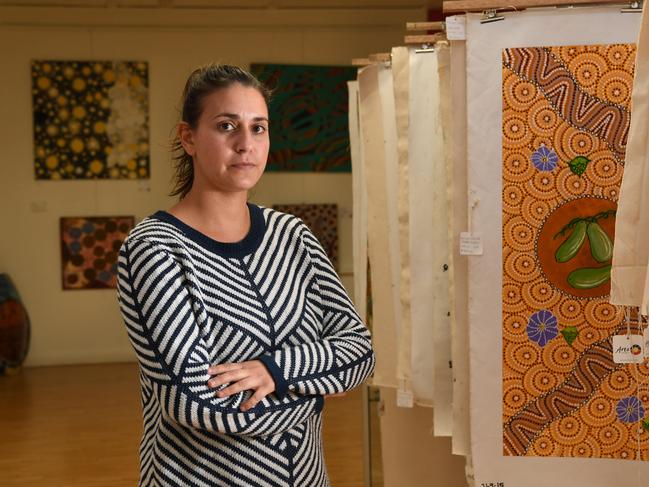
“If you were here at the wrong time, you would have seen mobs of up to 40 or 50 people fighting on the town’s foreshore. If you were here late at night, you would have seen large numbers of children as young as six, up to 50 in a group, up all night not going home at all. I was pretty horrified by some of the things that I saw.”
Suter says his concerns were highlighted in 2011 when the SA Coroner investigated the deaths of six indigenous people sleeping rough between 2004 and 2009 from nearby Yalata. The town, and nearby communities, had a culture of drinking that was harming its residents, he says. “That really made me … really keen to try and do something about the situation,” he says. That’s why he backs the card. By stopping easy access to booze and gambling, there would be more sober parents, more cash for kids’ school materials, books and clothes. It would be a chance to crack intergenerational poverty.
‘TREATED LIKE ADDICTS’
But, given many in the town are Aboriginal, it’s also seen as racist or at least a breach of civil liberties. Why should the Government tell you what you can spend your money on? Wouldn’t it be better to create more job opportunities for those on welfare?
In the lounge room of her rented property in Denial Bay, just outside Ceduna, 60-year-old Glenda Richards is putting the final touches on a dot painting titled Seven Sisters. The proud Aboriginal woman doesn’t buy the argument the card will reduce social problems, and argues that it just creates more rifts. The qualified carer is happy to speak up. “They don’t employ Aboriginal people in this town anyway,” she says. “I have worked all of my life but I can’t get a job.”
Richards says the card has created a stigma that has made many like her angry. “Every time people use the card, they are identified as someone on welfare,” she says, pointing out it is branded with the Indue logo. “People that have the card are being treated like addicts.”
Richards scoffs at the suggestion by some, including the mayor, that the card has reduced gambling, and alcohol and drug use, in the town. “Nothing has changed,” she says.
That’s also the view of New Zealander Jocelyn Wighton. “There’s always ways and means for people to purchase alcohol and drugs,” the 62-year-old says.
Sitting in the lounge room of her one-bedroom, brick unit in Ceduna, the self-dubbed Kiwi battler says the card is horribly restrictive. “I have tried my darnedest to make it work for me,” she says.
Wighton volunteers at the local craft shop a few days a week, and spends her other days knitting presents for her grandchildren and watching TV. She says the restrictions on the cash she can draw from her payment each fortnight makes it difficult to purchase second-hand goods – like knitting needles.
“The Ceduna ‘buy and sell’ on Facebook and the markets in and around town all require cash money,” she points out. She pulls out a recent rejection from eBay where she has tried to purchase cheap knitting needles. Surely you still purchase from online? “I could, but I would have to use my cash component,” Wighton says. “It is like there is a big block on the internet.”
At the nearby drug and alcohol rehabilitation centre, Alinda Hogg, the project co-ordinator of the day centre called Stepping Stones, can see pros and cons. Five days a week, the centre offers a place for Aboriginal people, many of whom travel to Ceduna from other communities, to have a shower, do some laundry and watch TV – and get some hot food. Dozens of people, young and old, are enjoying a hot breakfast of eggs, hamburgers and toast.
“We are known as a breakfast and lunch provider, but we do a lot more than that,” says Hogg, who adds demand for services at the centre have been growing. “There are still instances of domestic violence, and drug and alcohol use is about,” Hogg says, adding that a black market for alcohol has emerged since the card trial began. “I have heard from one of the clients that they are buying alcohol for $80 to $100 for a five litre cask.
“But I have heard a lot of good things, too. Kids are going to school more now. They are getting fed before they go to school.”
But if you’re going to limit access to booze and drugs, you need to fill the void. People used to drinking and getting wasted need alternatives. It could be a job – it could be helping them tap into something creative.
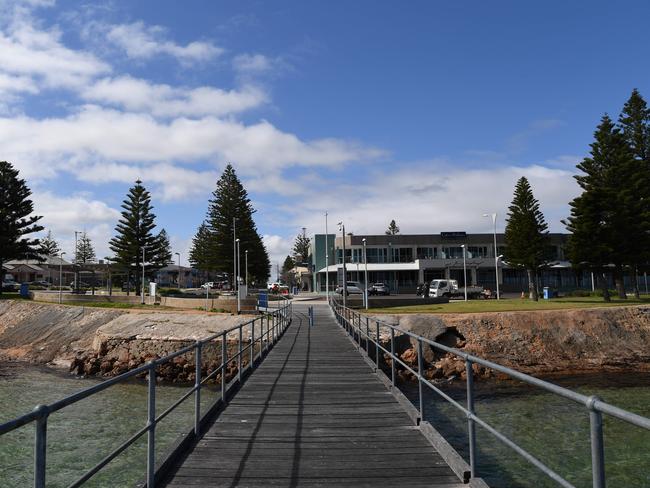
Ashley Pompey, 37, had a history of drug and alcohol abuse but turned his life around through art. “I do painting to keep me off benefits,” he says. “I started off here, through working on the dole. Being on Newstart and being on the cashless card does not see you through to the next fortnight. I have been here three years. I have won four state arts awards for the centre. My passion has driven me to keep going.”
Pompey would like to see more support for artists. “It is rare to get males to jump on board,” he says. “When there were men here they became like idols to me and I just wanted to be like them and keep coming.”
Arts Ceduna manager Serena Grunter says art offers an extraordinary opportunity for artists to earn income and promote their culture. “Art is a huge part of sharing our culture,” she says. “It is a huge part of the healing process.”
Grunter said people have found a way around the cashless welfare card. “There are still issues with drugs, alcohol and swapping sex for money,” she says.
And many people have moved to communities outside the town, and places like Whyalla and Port Augusta. “Maybe that was the plan all along.”
SCAMS AND SECRETS
Ken Hopper has lived in Ceduna since police found him dehydrated and delirious on the Nullarbor two years ago. His Tarago van had broken down after he’d left Perth on a journey that was supposed to take him around Australia. Now the 65-year-old is content riding a bicycle up and down the main streets of Ceduna. Chopper, his nickname, knows everyone. He was on the card for a while. “I found the card very hard, because say you wanted to buy an ice cream, you can’t put it on the card,” he says. “I was trying to save and go to Bali. If you want to save up for a car? How do you do that? It is ridiculous.”
Chopper is right, and wrong. There are places where he could buy an ice cream – if they have EFTPOS facilities or are set up to take the card. It’s a little thing, but highlights how people feel they’ve lost their autonomy.
“Most of the people think it is a waste of time and a pain,” he says. “I have to be careful. I can’t tell you too much. But if they want the grog they will go to someone like you and say ‘I will pay for your groceries if you give me the cash’ or ‘I will buy you a packet of smokes if you give me the cash’.
“It is going to happen anyway. The police say there are no drugs left in the town but that is a load of crap. I was in the town for two days and knew who had what and where to get it. There is so many drugs in this town you would not believe it.”
Similar theories about how to access booze, despite the card, are shared with SAWeekend all week. Tourists are often targeted, several people say. But often, when people in Ceduna speak, they’re reluctant to put their name to it. That makes it difficult to know what the town really thinks about the card. Some Aboriginal people support it, some white people oppose it. And some can see good points about it, even if they don’t like the concept.
Several times, SAWeekend spoke to Aboriginal people who supported the card but would not say so publicly.
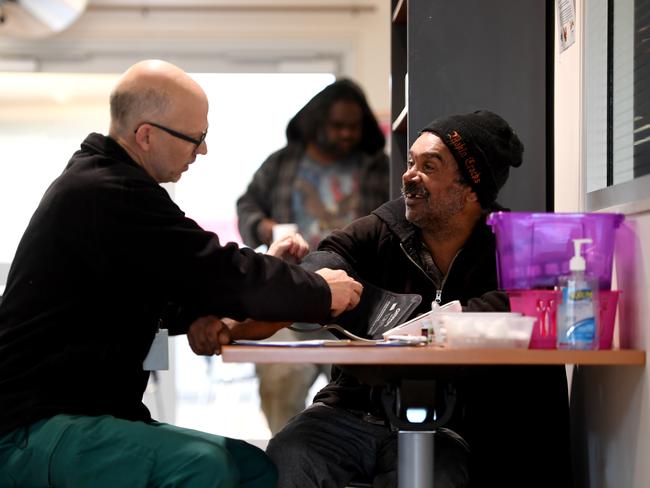
For example, outside Stepping Stones one young Aboriginal man, who had asked for petrol money just a few minutes earlier, shared his views, but only privately. “What do you think of the Indue card?” we ask, expecting him to criticise it. Instead, he throws his support behind it. “It’s good,” he says. “The kids are getting looked after. The old fellas can’t spend it all on booze.”
There appears to be a genuine fear about talking about any positive effects the card may be having on the town within both the Aboriginal and business communities.
Ceduna’s town centre is much the same as regional centres across the country. There’s a bakery, some banks, a sports store, an opportunity shop, an up-market clothing and homewares shop, a couple of electrical retailers, and a big independent grocery store as an anchor in the middle of the main street.
Ask the shopkeepers if the card is working and the majority say “yes”. But ask if they want to talk about the card on the record, they all say “no”. The reason, they argue, is simple: they have to live and work in a town where most of their customers hate the card.
Store owners tell stories of mothers and grandmothers coming in on pay days spending up big on children’s clothes and toys instead of the money being taken from them to be spent at the bottle shop. One seriously considers talking on the record “to let people know that it is a good thing”. But, like the rest of the shopkeepers, he’s not willing to put up his hand to spruik the card to the rest of Australia.
WEIGHING THE EVIDENCE
If the card was having any benefit, one place you might expect to see a difference in some very predictable places: the local hospital, the police station, the schools, and the Ceduna Circuit Court, which sits every few months.
But things are never so simple. Reliable and relevant figures are hard to come by.
One local with an expert knowledge of the judicial system says he believes the card has helped cut the number of incidents of alcohol-related domestic violence. But alcohol-related crime is still a regular theme in the court. “The thing is with the people around here, if there is a way to get around things, they will,” he says.
Local police, despite numerous approaches, declined to give their opinion. But in a statement, a SAPOL spokesman in Adelaide said an analysis of police data from Ceduna since 2015 showed that crime reports had remained reasonably stable in the area. So the card hasn’t worked?
Police are reluctant to read too much into any crime statistics because they say something as simple as a single repeat offender can skew figures.
The numbers, since the introduction of the card, don’t do much to make things any clearer. The number of Public Intoxication Act offences has fallen from 438 to 364. But domestic violence offences, each year, have risen from 158 to 222. If the card is reducing alcohol-related violence, including domestic violence, the police are not willing to say so.
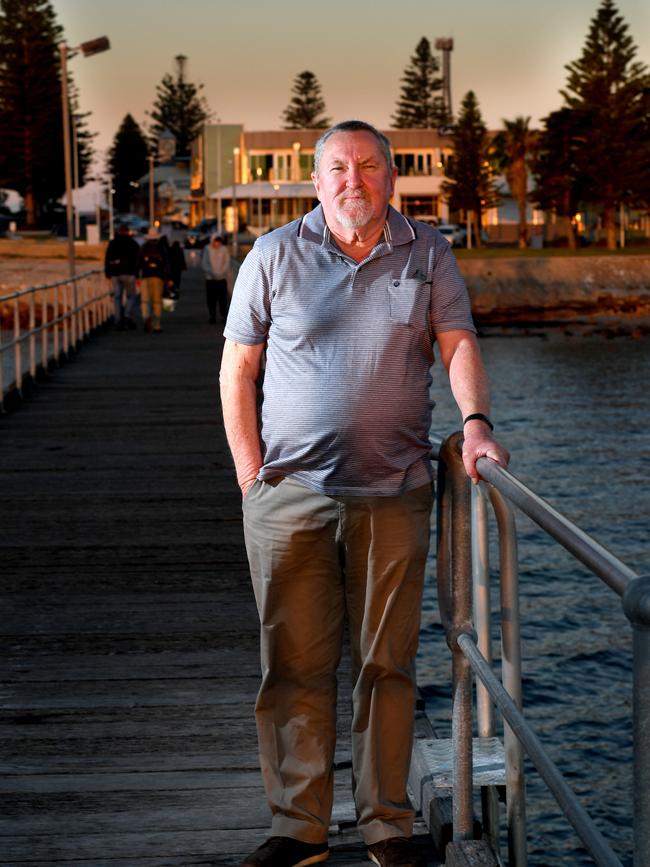
At Ceduna Hospital, staff see fewer inpatient admissions for treatment of alcohol dependence, alcohol withdrawal or intoxication – which have reduced from 24 a year to 14 last financial year. Emergency Department presentations, with an injury or illness that was alcohol-related, have also dropped from an average of 21.5 presentations a month to 16.
Ceduna Area School’s principal declined to talk to SAWeekend about the Indue card. The My School government website shows mixed results in the student attendance level – the proportion of students attending 90 per cent or more of the school year. In 2015, the attendance level for all students from Year 1 to Year 10 was 27 per cent for indigenous students and 70 per cent for non-indigenous students. Last year, that figure had increased to 36 per cent for indigenous students and dropped to 69 per cent for non-indigenous students.
It’s a confused picture, one not helped by recent reports into progress. A Senate committee last month argued the cashless welfare card trial in Ceduna and WA was having a positive effect on local communities and recommended it be extended to other states. But the National Audit Office found the trial had monitoring and evaluation systems so inadequate it was unable to conclude whether it had achieved its aims.
Critics also argue there may be other explanations for any improvement in social conditions in Ceduna – and Suter concedes extra services, including a drop-in centre run by Red Cross, have helped to change the vibe. But the mayor refuses to believe the card has not improved the lives of Ceduna residents.
“A common theme when talking to kids (before the card was introduced) was that they did not want to go home because it was not safe,” Suter says. “This is where I believe the card has done the most good.
“It has totally changed the lives of a lot of people that now get to regularly eat meals, they get to go to school, they are clean, they get clothing bought for them. Clothing sales went through the roof when we first introduced the card and, to me, that is really the best thing about it. The kids were the ones that were suffering the most.”
